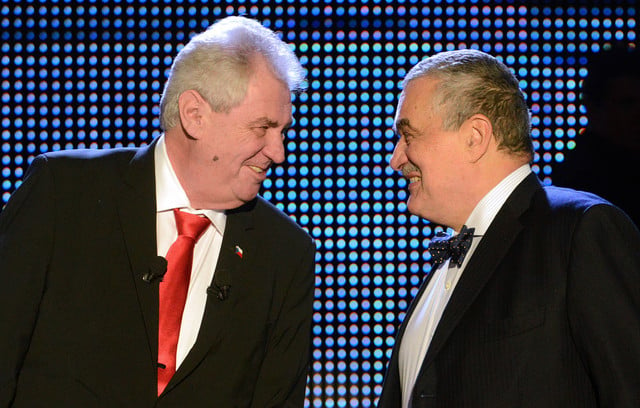
Candidates for president of Czech Republic meet in a TV debate on Jan. 24, 2013: former Prime Minister Milos Zeman (left) vs. current government’s Foreign Minister Karel Schwarzenberg (right). As an alternative to the current administration’s austerity policies, Zeman emerged victorious on Sat. Jan. 26. It was the first time the people of the Czech Republic directly elected their president. Photo credit: Michal Cizek/AFP/Getty Images
On Sat. Jan. 26, 2013 the people of the Czech Republic elected Milos Zeman to be their next president. This news will not have much direct impact on the country’s operations, as the Czech president is largely a ceremonial role. But Zeman becoming president is significant because:
It will be interesting to see if the Czech government shifts it positions on these issues to be in line with its new president. Zeman is replacing Vaclav Klaus, much a critic of European integration. Plus the people’s selection of Zeman seems a rejection of the present government’s (Schwarzenberg serves as Deputy PM in addition to Foreign Minister) economic decisions. Czech Republic is one of many European countries to implement austerity measures, oft-unpopular spending cuts intended to reduce budget deficits.
It is also interesting to me to see that one of the defining issues of the presidential campaign had nothing to do with any current threat, but a ghost from the country’s volatile past. In 1945 (as WWII ended) three million ethnic Germans were expelled from what was then Czechoslovakia, a move the victorious Allies supported. Schwarzenberg publicly criticized this action, saying Czechs should not be proud of it. Zeman and even Klaus–appointed by Schwarzenberg’s government–cried foul, deriding the comment as anti-Czech. Josef Mlejnek, a political analyst from Prague’s Charles University, commented that with this dispute “nationalism took over the campaign.”
Whether or not this incident impacted Zeman’s victory — and it seems like it did — it is a sobering reminder of how actions taken almost 70 years ago can still reverberate today.
So Zeman will lead Czech Republic as it tries to get back on its feet economically (along with most of the world). He will likely have much to say about the direction his country takes, but it remains unclear to what extent the government will agree with his agenda. Regardless of how this plays out, the people now get to directly choose their president- a reflection of a solid democracy.